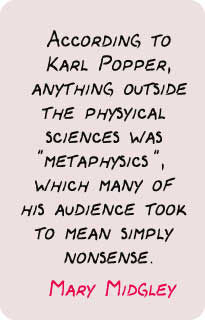|
|
Katalina Groh, Larry Prusak: Some of the world's leading thinkers |
| Two modes of knowing: abstract and narrative |
| b. Antidotes to scientific triumphalism |
 |
What
does it mean to be scientific?
The
word "scientific" is troublesome because it now has two distinct meanings
which contrast it with two distinct set of opposites. On the one hand,
it can be a quite general word of praise, meaning simply thorough
and methodical as opposed to casual, vague or amateurish. In that
sense, some historians or linguists or logicians can be called scientific
- or unscientific - just as properly as astronomers.
|
| When these two meanings
get mixed, it seems obvious by definition that the methods of the natural
sciences are not just the best methods but the only ones that are intellectually
respectable at all.... This idea that the methods of physical science are
simply the only intellectual methods and should therefore be extended,
to cover every subject matter, including our understanding of ourselves,
was put forward early in the nineteenth century by August Comte and others,.
It is still a powerful faith, devoutly preached by many people today.
Only a radical confusion about the meaning of the word "scientific" makes
it seem plausible....
The objectivity [of science] requires that all observers should stand at the same point of view and abstract from their individual differences. But this kind of abstraction simply cannot be used when we are talking about human affairs. There is no way in which we can collect about any significant aspect of human life without looking at them from some particular angle. We have to guide our selection by means of some value judgment about what matters in it and what does not. And these judgments inevitably arise out of each inquirer's moral position. When such judgments raise difficulties, they need to be justified morally by explaining that position, not by ignoring it. Social and psychological theorists who claim to be operating in a value-free vacuum outside morality are notoriously deceiving themselves.... [From the early 19th century] the new social sciences started life as sciences in the old general sense - methodical forms of thought, parallel to history and logic, which would use whatever kinds of reasoning seemed helpful in handling their subject matter... What finally broke up this hospitable, inclusive idea of "science" was the steadily growing prestige of the physical sciences themselves... After the Second World War, the guillotine came down. Karl Popper then pointed that the Marxist and Freudian ideologies were not actually constructed by the methods of the physical sciences and could not therefore be described in modern terms as scientific. Popper's work seemed to outlaw all such argument from the province of thought, ruling, since it was not science, it was metaphysics, a word which he used vaguely and which many of his audience took to mean simply nonsense. There followed a jubilant wave of crude scientism, not just in the sense of that people put too high a value on science in comparison with other branches of learning or culture, but in the wider sense that they often forgot those other branches existed at all. This narrow vision... now became explicit. Its prophets tend still to assume that the only available forms of though other "science" are religion and parapsychology. From Mary Midgley, Science and Poetry, (Routledge, London, 2001) pp.144-150. |
| Books and videos on storytelling *** In Good Company : How Social Capital Makes Organizations Work by Don Cohen, Laurence Prusak (February 2001) Harvard Business School Press *** The Social Life of Information, by John Seely Brown, Paul Duguid (February 2000) Harvard Business School Press *** The Springboard : How Storytelling Ignites Action in Knowledge-Era Organizations by Stephen Denning (October 2000) Butterworth-Heinemann *** The Art of Possibility, a video with Ben and Ros Zander : Groh Publications (February 2001) |
| The views expressed on this website are those of the authors, and not necessarily those of any person or organization |
| Site optimized in 800x600: webmaster CR WEB CONSULTING |
|
|
|
|